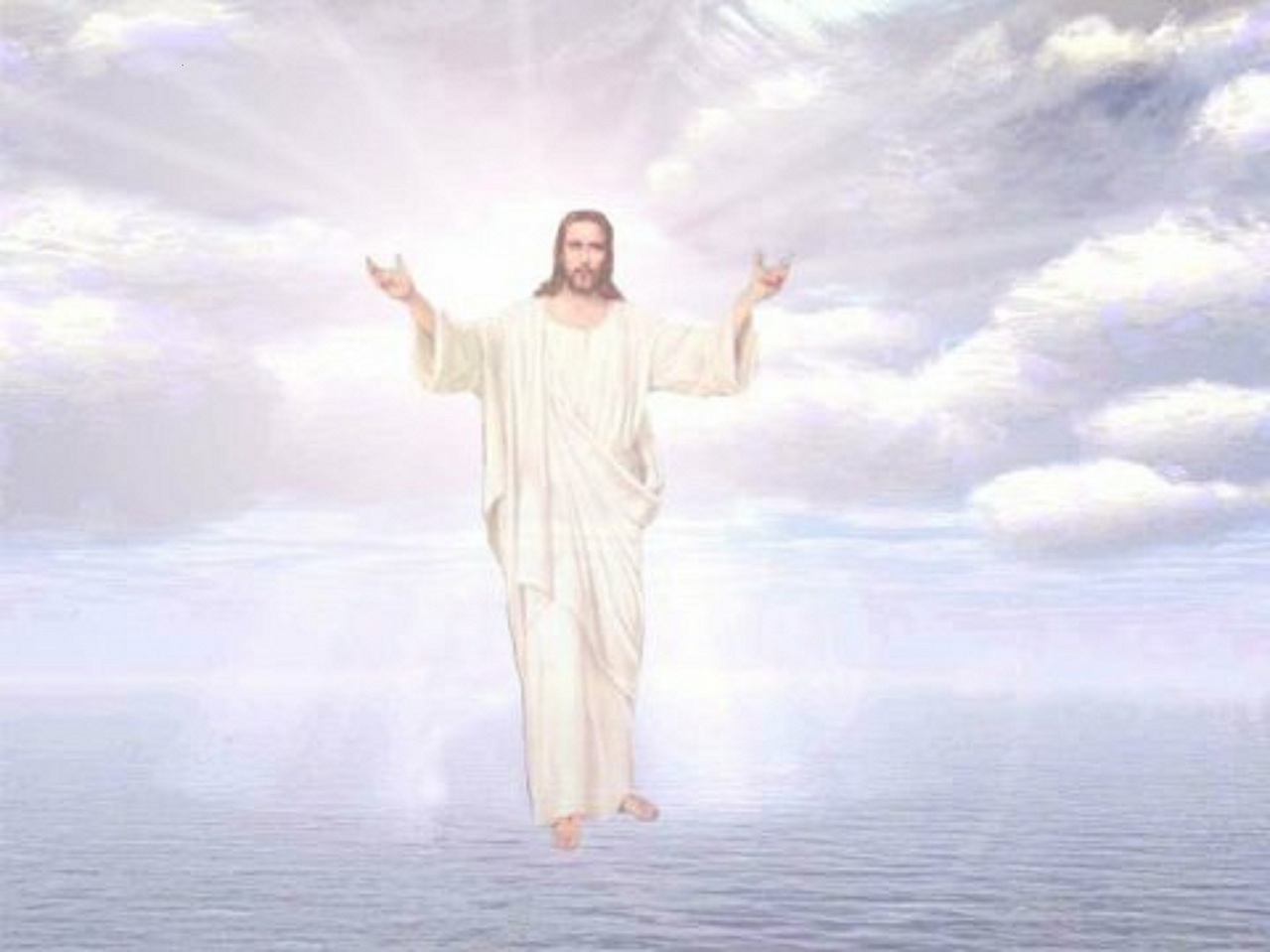
FUTURE LIFE: A LOOK AT WHAT THE BIBLE TELLS US ABOUT ETERNAL LIFE!
Part 2 of a 2-Part Article Series.......
Part 2 of a 2-Part Article Series.......


Though life during the millennium will be very different from today, the most important aspect of future life for all people of any age is he potential possession of eternal life! Eternal life is a gift from God given to all who believe in Jesus Christ and have accepted His offer of salvation based upon His death and resurrection (John 3:15-16; John 10:10; and, Ephesians 2:8-9).
"Eternal Life"

John 3:15-16: (KJV) 15 That whosoever believeth in him should not perish, but have eternal life.
16 For God so loved the world, that he gave his only begotten Son, that whosoever believeth in him should not perish, but have everlasting life.
John 10:10: (KJV) The thief cometh not, but for to steal, and to kill, and to destroy: I am come that they might have life, and that they might have it more abundantly.
Ephesians 2:8-9: (KJV) 8 For by grace are ye saved through faith; and that not of yourselves: it is the gift of God:
9 Not of works, lest any man should boast.
16 For God so loved the world, that he gave his only begotten Son, that whosoever believeth in him should not perish, but have everlasting life.
John 10:10: (KJV) The thief cometh not, but for to steal, and to kill, and to destroy: I am come that they might have life, and that they might have it more abundantly.
Ephesians 2:8-9: (KJV) 8 For by grace are ye saved through faith; and that not of yourselves: it is the gift of God:
9 Not of works, lest any man should boast.
The recipient of this divinely bestowed gift lives forever in the blessedness of God's presence.
Eternal life stems from the character of God, Who is eternal (see Deuteronomy 33:27; Psalm 10:16; Psalm 90:2; Isaiah 26:4; and, Jeremiah 10:10). Because God is eternal, so also is God's Word, which is grounded in His being and will.
Eternal life stems from the character of God, Who is eternal (see Deuteronomy 33:27; Psalm 10:16; Psalm 90:2; Isaiah 26:4; and, Jeremiah 10:10). Because God is eternal, so also is God's Word, which is grounded in His being and will.

Psalm 119:89: (KJV) LAMED. For ever, O LORD, thy word is settled in heaven.
Other divine attributes, actions, and benefits that are eternal include God's love (see 1st Kings 10:9 and Psalm 136), blessings (see Psalm 21:6), Covenants, reign, and rule (see Psalm 9:7 and Psalm 66:7), plans (see Psalm 33:11), inheritance of His people (see Psalm 37:18), faithfulness (see Psalm 117:2), statutes (see Psalm 119:152), and His Name (see Psalm 135:13). Especially noteworthy from a prophetic perspective is the fact that except for the Mosaic or Old Covenant, God's Covenants are eternal -- the Abrahamic Covenant (see Genesis 17:7, Genesis 13:19; 1st Chronicles 16:17; and, Psalm 105:10), the Davidic Covenant (see 2nd Samuel 23:5), and the New Covenant (see Ezekiel 37:26 and Hebrews 13:20).
Eternal life is a major theme in the Bible, and especially the New Testament, where it is mentioned more than 40 times! Eternal life emphasizes a quality of life -- a quality that can only be imparted by God Himself to those who trust and serve Him. Yet it pertains not only to a quality of life in this age and the age to come; but also to the duration of that future age -- the eternal state. This quality of life does not, of course, make individual believers divine. The redeemed are and will always remain creatures. The Creator-creature distinction has no end.
Beyond the teachings of Jesus in the Gospels, eternal life is also emphasized in 1st John (see 1st John 1:2; 1st John 2:25; 1st John 3:15; 1st John 5:11; 1st John 5:13; and, 1st John 5:20) and in the letters of Paul (see Romans 2:7; Romans 5:21; Romans 6:22-23; 1st Timothy 1:16; 1st Timothy 6:12; and Titus 1:1-2). Jude 2 (NASB) encourages readers to "Keep yourselves in the love of God, waiting anxiously for the mercy of our Lord Jesus Christ to eternal life." Paul teaches that the Christian has received the Spirit as a pledge of eternal life, but he awaits the redemption of the body (Romans 8:23 and 1st Corinthians 15:53).
Eternal life is a major theme in the Bible, and especially the New Testament, where it is mentioned more than 40 times! Eternal life emphasizes a quality of life -- a quality that can only be imparted by God Himself to those who trust and serve Him. Yet it pertains not only to a quality of life in this age and the age to come; but also to the duration of that future age -- the eternal state. This quality of life does not, of course, make individual believers divine. The redeemed are and will always remain creatures. The Creator-creature distinction has no end.
Beyond the teachings of Jesus in the Gospels, eternal life is also emphasized in 1st John (see 1st John 1:2; 1st John 2:25; 1st John 3:15; 1st John 5:11; 1st John 5:13; and, 1st John 5:20) and in the letters of Paul (see Romans 2:7; Romans 5:21; Romans 6:22-23; 1st Timothy 1:16; 1st Timothy 6:12; and Titus 1:1-2). Jude 2 (NASB) encourages readers to "Keep yourselves in the love of God, waiting anxiously for the mercy of our Lord Jesus Christ to eternal life." Paul teaches that the Christian has received the Spirit as a pledge of eternal life, but he awaits the redemption of the body (Romans 8:23 and 1st Corinthians 15:53).

Romans 8:23: (KJV) And not only they, but ourselves also, which have the firstfruits of the Spirit, even we ourselves groan within ourselves, waiting for the adoption, to wit, the redemption of our body.
1st Corinthians 15:53: (KJV) For this corruptible must put on incorruption, and this mortal must put on immortality.
1st Corinthians 15:53: (KJV) For this corruptible must put on incorruption, and this mortal must put on immortality.
This redemption, which began with the resurrection of Jesus from the dead (1st Corinthians 15:12-19), will continue with the resurrection of believers in the future.

1st Corinthians 15:12-19: (KJV) 12 Now if Christ be preached that he rose from the dead, how say some among you that there is no resurrection of the dead?
13 But if there be no resurrection of the dead, then is Christ not risen:
14 And if Christ be not risen, then is our preaching vain, and your faith is also vain.
15 Yea, and we are found false witnesses of God; because we have testified of God that he raised up Christ: whom he raised not up, if so be that the dead rise not.
16 For if the dead rise not, then is not Christ raised:
17 And if Christ be not raised, your faith is vain; ye are yet in your sins.
18 Then they also which are fallen asleep in Christ are perished.
19 If in this life only we have hope in Christ, we are of all men most miserable.
13 But if there be no resurrection of the dead, then is Christ not risen:
14 And if Christ be not risen, then is our preaching vain, and your faith is also vain.
15 Yea, and we are found false witnesses of God; because we have testified of God that he raised up Christ: whom he raised not up, if so be that the dead rise not.
16 For if the dead rise not, then is not Christ raised:
17 And if Christ be not raised, your faith is vain; ye are yet in your sins.
18 Then they also which are fallen asleep in Christ are perished.
19 If in this life only we have hope in Christ, we are of all men most miserable.
The timing of the resurrection of these individuals depends upon whether they were Old Testament saints, Christians living before or at the time of the rapture, or Christian martyrs of the Tribulation. All of these in this "first resurrection" comprise the category "resurrection of life" as contrasted with those in the "second resurrection" or "resurrection of judgment" (John 15:29 and Revelation 20:5-6).

John 5:29: (KJV) And shall come forth; they that have done good, unto the resurrection of life; and they that have done evil, unto the resurrection of damnation.
Revelation 20:5-6: (KJV) 5 But the rest of the dead lived not again until the thousand years were finished. This is the first resurrection.
6 Blessed and holy is he that hath part in the first resurrection: on such the second death hath no power, but they shall be priests of God and of Christ, and shall reign with him a thousand years.
Revelation 20:5-6: (KJV) 5 But the rest of the dead lived not again until the thousand years were finished. This is the first resurrection.
6 Blessed and holy is he that hath part in the first resurrection: on such the second death hath no power, but they shall be priests of God and of Christ, and shall reign with him a thousand years.
Eternal life, as presented in the Bible, should not be confused with the endless or eternal existence that everyone will experience. Eternal existence will be common to the redeemed and the unredeemed, but the destinies will be very different!

1st John 5:12: (KJV) He that hath the Son hath life; and he that hath not the Son of God hath not life.
Christians will enter into Heaven and the presence of God; unbelievers will be cast into the lake of fire.
The sure and lasting salvation of eternal life is repeatedly contrasted with the destruction of the non-believer in the New Testament. Those who believe in Jesus Christ the Son of God receive eternal life, but those who reject the Son have eternal life withheld (see John 3:36), and as a result will suffer eternal destruction (see Matthew 7:13; 2nd Corinthians 4:3; and, 2nd Peter 3:9). The future life of every person throughout history who has received eternal life will be filled with the glories and experiences of Heaven! Revelation, chapter 21, provides a description of the New Jerusalem and the eternal state. In part, the experiences of life in Heaven include no pain, no suffering, no hardships, no tears, and no death.
The sure and lasting salvation of eternal life is repeatedly contrasted with the destruction of the non-believer in the New Testament. Those who believe in Jesus Christ the Son of God receive eternal life, but those who reject the Son have eternal life withheld (see John 3:36), and as a result will suffer eternal destruction (see Matthew 7:13; 2nd Corinthians 4:3; and, 2nd Peter 3:9). The future life of every person throughout history who has received eternal life will be filled with the glories and experiences of Heaven! Revelation, chapter 21, provides a description of the New Jerusalem and the eternal state. In part, the experiences of life in Heaven include no pain, no suffering, no hardships, no tears, and no death.

Revelation 21:4: (KJV) And God shall wipe away all tears from their eyes; and there shall be no more death, neither sorrow, nor crying, neither shall there be any more pain: for the former things are passed away.
Written by Timothy J. Demy
The Popular Encyclopedia Of Bible Prophecy
The Popular Encyclopedia Of Bible Prophecy
"OVERVIEW OF REVELATION, CHAPTER 21"
Chapter Summary
John now sees what we call "Heaven"; a totally new Heaven and earth, a fresh creation destined to be the home of God and His people (verse 1). John sees a New Jerusalem, the symbol of God's presence, decending (verses 2-5). He hears Christ proclaim that this new creation the home of the godly, from which sin and sinners are forever excluded (verses 6-8). John is then given a closer look at the vast New Jerusalem, glistening with jewels (verses 9-21). He realizes that there is no temple in the city, for God Himself is present and provides its light! That city thus serves as a beacon for all humankind (verses 22-27).
John now sees what we call "Heaven"; a totally new Heaven and earth, a fresh creation destined to be the home of God and His people (verse 1). John sees a New Jerusalem, the symbol of God's presence, decending (verses 2-5). He hears Christ proclaim that this new creation the home of the godly, from which sin and sinners are forever excluded (verses 6-8). John is then given a closer look at the vast New Jerusalem, glistening with jewels (verses 9-21). He realizes that there is no temple in the city, for God Himself is present and provides its light! That city thus serves as a beacon for all humankind (verses 22-27).
Old Testament Parallels
Both Isaiah, Chapters 60 and 65, and Ezekiel, Chapters 40-48, contain parallels to John's image of the new Heaven and earth, and the New Jerusalem as well!
New And Old Jerusalem
The earthly Jerusalem was intended to be the site of the temple of God, the symbol of His presence among His people and the place where He might be approached in worship. The New (kaine: new and superior) Jerusalem fulfills the promise of the old. God is present in reality, and here His people can worship Him freely and enjoy His presence forever!
The Jewels (Verses 18-21)
The point of the jewels that encrust the city is not to give an impression of wealth and luxury. Rather, the scintillating light that shimmers and reflects from the city foundations and gates speaks of God's glory. The holy city called the New Jerusalem is in the form of a jewel-studded cube some 1,400 miles long, wide, and deep. Some scoffers have calculated its capacity and determined that even a city of this size does not have room for enough residents. But they ignore the chapter's report that the city is not Heaven itself, but the captial of a vast, newly created universe! We have no real knowledge of what Heaven will be like, or how we will serve God there. What we do know is that life there is endless, that it will be lived in God's presence, and that neither sin nor any of its consequences will ever be experienced by us again! If we are impressed at the care with which God created Eden, to give Adam and Eve every opportunity to use each human capacity to the fullest, we can only wonder how His creativity and grace will be expressed in shaping Heaven for His glory -- and our fulfiillment in Him!
Both Isaiah, Chapters 60 and 65, and Ezekiel, Chapters 40-48, contain parallels to John's image of the new Heaven and earth, and the New Jerusalem as well!
New And Old Jerusalem
The earthly Jerusalem was intended to be the site of the temple of God, the symbol of His presence among His people and the place where He might be approached in worship. The New (kaine: new and superior) Jerusalem fulfills the promise of the old. God is present in reality, and here His people can worship Him freely and enjoy His presence forever!
The Jewels (Verses 18-21)
The point of the jewels that encrust the city is not to give an impression of wealth and luxury. Rather, the scintillating light that shimmers and reflects from the city foundations and gates speaks of God's glory. The holy city called the New Jerusalem is in the form of a jewel-studded cube some 1,400 miles long, wide, and deep. Some scoffers have calculated its capacity and determined that even a city of this size does not have room for enough residents. But they ignore the chapter's report that the city is not Heaven itself, but the captial of a vast, newly created universe! We have no real knowledge of what Heaven will be like, or how we will serve God there. What we do know is that life there is endless, that it will be lived in God's presence, and that neither sin nor any of its consequences will ever be experienced by us again! If we are impressed at the care with which God created Eden, to give Adam and Eve every opportunity to use each human capacity to the fullest, we can only wonder how His creativity and grace will be expressed in shaping Heaven for His glory -- and our fulfiillment in Him!
The Nations (Verses 24-26)
In the rest of the New Testament, the term ethne indicates the rebellious pagans of a hostile world. Who are the ethne here, since all but God's redeemed are excluded from His new creation? The only possible answer is that they stand for the redeemed, who inhabit the whole earth as well as the holy city. The point of the description is to show that the redeemed are involved in active social and other relationships that bring glory to God!
In the rest of the New Testament, the term ethne indicates the rebellious pagans of a hostile world. Who are the ethne here, since all but God's redeemed are excluded from His new creation? The only possible answer is that they stand for the redeemed, who inhabit the whole earth as well as the holy city. The point of the description is to show that the redeemed are involved in active social and other relationships that bring glory to God!

Insight
Two Interpretations: The premillennialist sees this as a portrait of eternity, the destined home of the redeemed in a freshly created and sinless universe. Amillennialists also view this as a portrait of eternity, but insist that the details are to be taken symbolically. Thus the New Jerusalem is not a city, but the Church triumphant, while the "new" universe is our present creation cleansed of sin and revitalized.
Heaven
These chapters describe what most Christians would call "Heaven". Heaven is not some ethereal realm beyond the clouds, but a completely new universe, created to be the home of the redeemed. The key physical features are the lack of any sea and the suffusion (a spreading out) of the universe with light that is not dependent on star or sun. The major feature is a vast city call the "New Jerusalem". But the most important aspect of "Heaven" is the relationship the redeemed have with God! He is present with us; we will see His face! And because we are His and He is ours, never again will mankind know death, crying, mourning, or pain. What makes Heaven so awesome is God!
Two Interpretations: The premillennialist sees this as a portrait of eternity, the destined home of the redeemed in a freshly created and sinless universe. Amillennialists also view this as a portrait of eternity, but insist that the details are to be taken symbolically. Thus the New Jerusalem is not a city, but the Church triumphant, while the "new" universe is our present creation cleansed of sin and revitalized.
Heaven
These chapters describe what most Christians would call "Heaven". Heaven is not some ethereal realm beyond the clouds, but a completely new universe, created to be the home of the redeemed. The key physical features are the lack of any sea and the suffusion (a spreading out) of the universe with light that is not dependent on star or sun. The major feature is a vast city call the "New Jerusalem". But the most important aspect of "Heaven" is the relationship the redeemed have with God! He is present with us; we will see His face! And because we are His and He is ours, never again will mankind know death, crying, mourning, or pain. What makes Heaven so awesome is God!



















